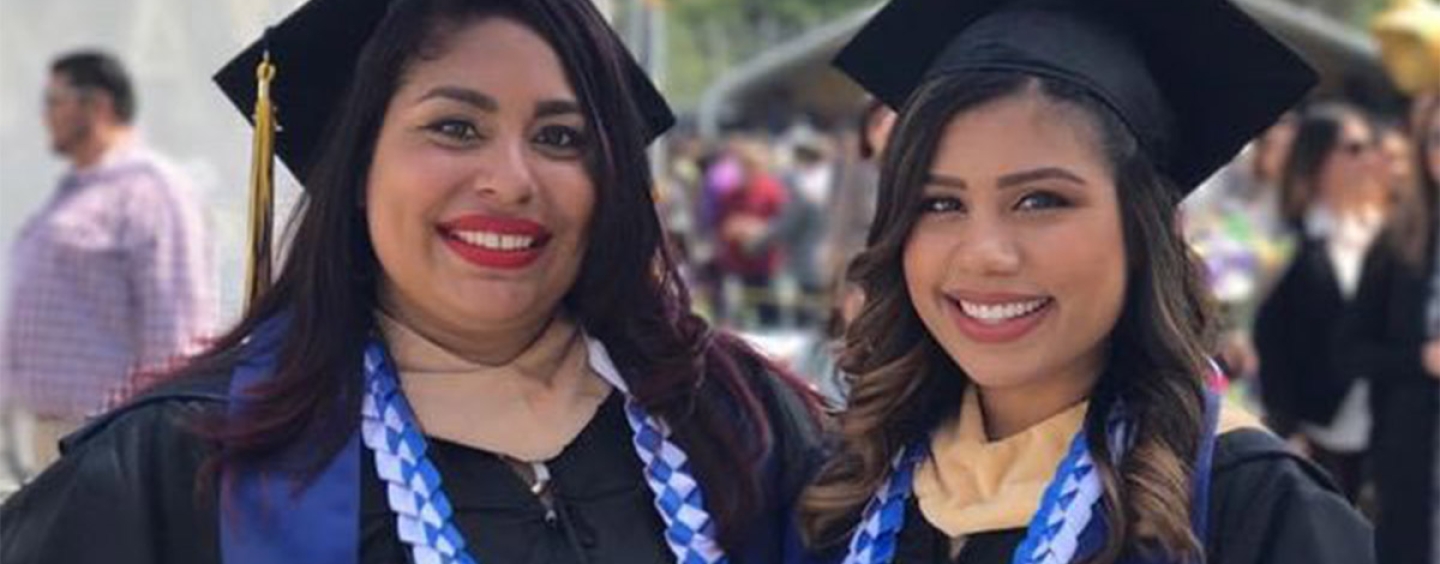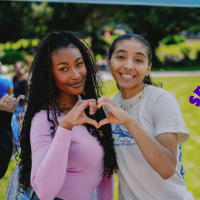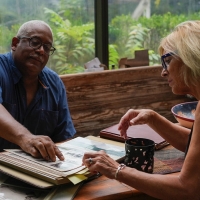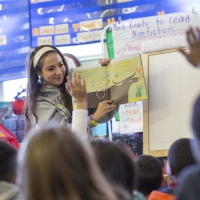Alumna’s online network inspires thousands of Latina students

Christina V. Rodriguez (left) and her sister both completed graduate school at the same college.
Influencer’s hashtag #LatinasWithMasters offers community to those earning degrees
Alumna Christina V. Rodriguez (B.A.,’12) is an influencer with a purpose — make higher education equitable for Latinx students. She’s turned her mission into a trending hashtag on social media — #LatinasWithMasters — which sprouted an online community that’s grown to more than 14,000. Since launching in July 2020, Latinas with Masters expanded from an Instagram handle to podcasts about diversity and inclusion, speaking engagements and consultant work on the same topic, resources for students, online workshops, an entire online community and much more.
The mother of two founded the company after feeling like an outsider in her MBA program at a small private university. She was the only Latina student in her cohort, an experience that was isolating and sometimes painful. It wasn’t that her instructors were prejudiced. In fact, they were great, she says. They just didn’t acknowledge the lack of diversity in the classroom. Instead, the focus of her classes was on business policies and procedures. To not acknowledge race or ethnicity felt like something was missing from the curriculum, she says.
“I am a Latina in business and that does affect the way that I show up to work and the way that I show up for my employees and the way I manage a business, you know,” she said.
The negative feelings from her MBA program may have been magnified because of her undergraduate experience at San Francisco State University, she adds. “San Francisco State is very diverse. I graduated in Latino Studies, so my entire curriculum was based on either my experience or Latino culture,” she said. Many of her classmates and faculty looked like her and had similar stories — children of immigrants who were the first in their families to attend college.
Rodriguez later learned the name for what she felt throughout the MBA program: imposter syndrome — that feeling of personal incompetence despite having the right experience and academic training. In 2020, she began a doctorate program in Educational Leadership at Mills College, which led her to reflect on her experience in business school. That’s when she got the idea for Latinas with Masters. She launched the Instagram page with the hope that she’d inspire other women of color to pursue advanced degrees and that she’d provide a community if they’re not finding one in their programs.
“[The thinking was] I know how to get a master’s degree and I identify as Latina, so let me create this online community where I share my experience getting into graduate school and share my experience while in graduate school,” she said.
Scrolling through her Instagram page, her posts are a mixture of the practical and the personal. It’s tips on applying to graduate school and financial aid and finding a support network while in graduate school. She also delves into more sensitive topics, such as the microaggressions women of color experience, negotiating salaries and being a mother in academia. “There are a lot of intersectionalities we as women of color experience that aren’t talked about inside of the classroom,” she adds.
Basically, Latinas with Masters is a resource for women of color navigating spaces that weren’t designed for them, Rodriguez says. And the members of the Latinas with Masters community are navigating a lot of different professional spaces.
“Some are speech pathologists, some work in health care, some are lawyers, and they’re like, ‘There’s a gap in this literature, here’s the gap in this industry’ and ‘I want to change that’ and ‘I want to create more awareness,’” Rodriguez said. “So Latinas with Masters is also the platform to create awareness of what needs to be changed in our community and in the higher education system.”
At the start of her doctorate program at Mills College, Rodriguez thought she’d become a professor. But after launching her company she’s more interested in how it can transform academia and other spaces to be more equitable. Maybe that means eliminating graduate school application fees or the GRE and GMAT as admission requirements — just a few examples of systemic changes she hopes institutions will embrace.
“We have to figure out what a shared vision of equity is,” she said, “so we can do the work together.”
Tags



